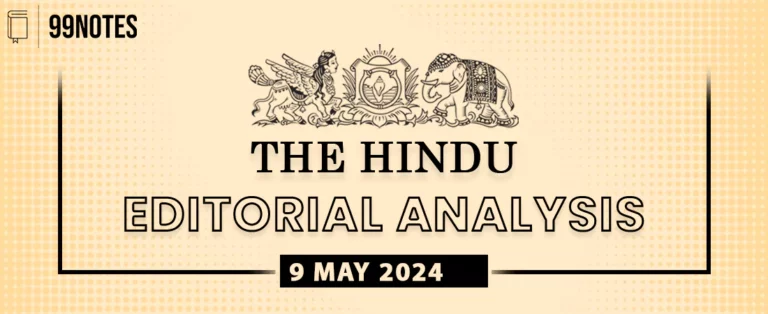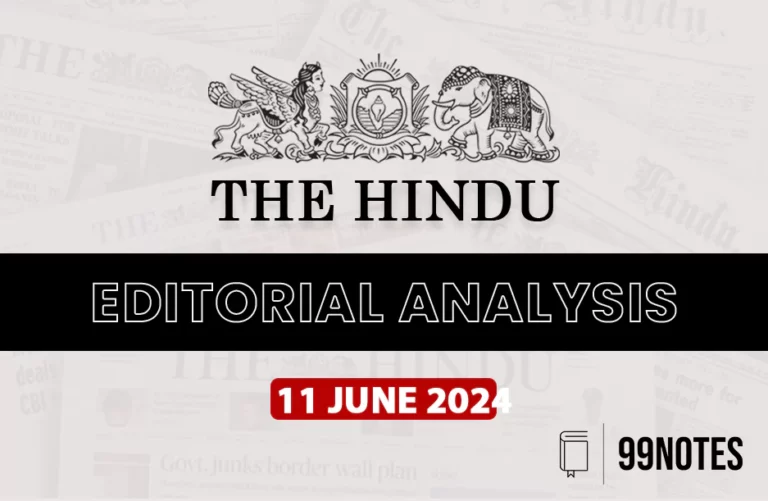19 February 2024 : The Hindu Editorial Notes PDF
The Hindu Editorial
19-February-2024
1. A ruling that gives primary school teaching a new slate.
| Topic: GS2 – Social Justice – Education Critical for UPSC as it reflects legal and educational policy dimensions, impacting teacher qualifications, disparities, and government initiatives in India. |
| Context |
|
Supreme Court Ruling on Teacher Qualifications:
- In August 2023, the Supreme Court of India upheld the Rajasthan High Court’s decision, stating that the Bachelor of Education (B.Ed) degree is not suitable for primary school teaching.
- The court emphasized the importance of specialized qualifications such as Diploma in Education (DEd), Diploma in Elementary Education (DElEd), or Bachelor of Elementary Education (BElEd) for teaching at the primary level.
Divergence in Qualifications:
- Primary Teaching Requirements: Teaching young students requires understanding Foundational Literacy and Numeracy (FLN) and specialized teacher education, not provided by B.Ed, which focuses on middle school and upwards.
- Right to Education Act 2009: Emphasizes the need for professional qualification and appropriate qualifications for teachers.
Current Scenario:
- Overall Qualified Teachers: State of Teachers, Teaching and Teacher Education Report 2023 (SoTTTER-23) indicates that 90% of teachers have professional qualifications.
- Discrepancies in Primary Grades: Only 46% of primary school teachers have DElEd or equivalent qualifications, with 30% having B.Ed degrees, and 10% lacking professional qualifications.
- Private Sector Disparities: In private unaided schools, 22% have DElEd, 43% have B.Ed, and 17% lack professional qualifications for primary teaching.
Challenges in Teacher Training Programs:
- Quality Disparities: Analysis of Teachers Eligibility Test (TET) data reveals that government-funded institutions perform better in terms of quality compared to self-financed institutions.
- Mathematics Competence Concerns: Low mean scores (46%) in mathematics highlight the need for attention to pedagogical content knowledge in teacher training programs.
Need for Government Support:
- Strengthening DElEd Programs: Urgent attention needed to increase the supply of high-quality DEd/DElEd/BElEd programs.
- ITEP Programs: Integrated Teacher Education Programme (ITEP) should focus more on preparatory and foundational stages, addressing the current emphasis on B.Ed.
Innovative Pathways and Government Initiatives:
- Flexible Pathways: Explore innovative programs to provide B.Ed holders with professional development and certification for primary teaching without enrolling in full degree/diploma programs.
- Recognition of Different Pathways: Most developed countries offer various pathways into the teaching profession, acknowledging that individuals decide to become teachers at different stages.
- Budgetary Considerations: The Union Budget 2023 commitment to strengthen teacher education needs comprehensive allocation for primary/preparatory stage teacher education and incentives for innovation.
Ministry of Education Initiatives:
- DIET Strengthening: Recent initiatives to strengthen District Institutes of Education and Training (DIETs) are welcomed.
- Comprehensive Government Response: Expectation for a comprehensive government response in the upcoming full Budget, addressing primary/preparatory stage teacher education through increased support and incentives for innovation.
Conclusion:
- The Supreme Court’s ruling emphasizing specialized qualifications for primary school teaching in India highlights the urgency to address disparities in teacher training.
- The need for government support and innovative pathways for educators, as discussed in the article, is crucial for improving the quality of primary education.
| Lack of Qualified Teachers in India |
Concerns:
Way Forward:
|
| PYQ: Consider the following statements: [2018] 1. As per the right to education (RTE) Act, to be eligible for appointment as a teacher in a state, a person would be required to possess the minimum qualification laid down by the concerned State council of Teacher education. 2. As per the RTE Act, for teaching primary classes, a candidate is required to pass a Teacher Eligibility Test conducted in accordance with the National Council of Teacher Education guidelines. 3. In India, more than 90 % of teacher education institutions are directly under the State Governments. Which of the statements given above is/are correct? a) 1 and 2 b) 2 only c) 1 and 3 d) 3 only Ans: b) |
| Practice Question: Discuss the implications of the Supreme Court’s ruling on teacher qualifications for primary education in India, considering disparities, government initiatives, and the need for innovative pathways. (250 words/15 m) |
2. Free movement regime between India, Myanmar had more benefits than costs
| Topic: GS2 – International Relations – Bilateral Relations GS3 – Internal Security – Security challenges and their management in border areas The issue underscores India’s regional diplomacy, state sentiments, and the balance between security imperatives and humanitarian considerations, crucial for UPSC. |
| Context |
|
Introduction:
- In the contentious context of scrapping the Free Movement Regime along the India-Myanmar border, the article explores the multifaceted implications, from security concerns to humanitarian aspects, and the divergent sentiments among Indian states.
Reasons behind Fencing:
- Home Minister Amit Shah’s decision to scrap FMR and fence the India-Myanmar border.
- Citing concerns about narcotics trafficking and support to insurgent groups in the region.
- Questioning the adequacy of these reasons, given the weakening of insurgent groups and the need for stronger law enforcement.
Contrasting Sentiments:
- Varied reactions from different states, with Manipur endorsing the scrapping of FMR, while Nagaland and Mizoram oppose it.
- Civil war in Myanmar leading to refugees seeking humanitarian relief in Mizoram and Manipur.
- Solidarity among Mizos and Kuki-Zo community in Manipur with the Chin community, creating a humanitarian aspect to the issue.
Local Opposition and Concerns:
- Opposition from Meitei majoritarian forces in the Imphal valley, raising concerns about Chin refugees as illegal migrants.
- FMR acts as a part of India’s Act East policy and an expression of people’s will in the region.
- Reversal of FMR and border fencing seen as a case of misplaced priorities, especially considering the rugged terrain.
Conclusion:
- Need for reconsideration of the decision to scrap FMR and fence the India-Myanmar border.
- Emphasis should be given on the humanitarian aspect and the historical ties among the people in the region.
- Call for a more nuanced approach that considers local sentiments and the broader vision of nation-building.
| PYQ: Cross-border movement of insurgents is only one of the several security challenges facing the policing of the border in North-East India. Examine the various challenges currently emanating across the India-Myanmar border. Also, discuss the steps to counter the challenges. (250 words/15m) (UPSC CSE (M) GS-3 2019) |
| Practice Question: How does the recent decision to scrap the Free Movement Regime along the India-Myanmar border reflect on India’s regional policies, considering the varied state sentiments and the interplay of security and humanitarian concerns? Discuss. (150 words/10 m) |
For Enquiry

19 February 2024 : The Hindu Editorial Notes PDF

19 February 2024 : PIB Summary for UPSC

19 Feb 2024 : Indian Express Editorial Analysis

17 Feb 2024 : Daily Current Affairs Quiz

17 Feb 2024 : Daily Answer Writing

17 Feb 2024 : Daily Current Affairs

17 February 2024 : The Hindu Editorial Notes PDF

17 Feb 2024 : Indian Express Editorial Analysis

17 February 2024 : PIB Summary for UPSC

16 Feb 2024 : Daily Current Affairs Quiz
Feb 2024 The Hindu 19 February 2024 : The Hindu Editorial Notes PDF The Hindu Editorial
17-February-2024
1. The clear message in the Court’s ‘no’ to electoral bonds.
Topic:…
feb 2024 PIB 19 February 2024 : PIB Summary for UPSC PIB Summary for UPSC
19-February -2024
1. IAF CONDUCTS ‘EXERCISE – VAYU SHAKTI-24’…
Indian Express 19 Feb 2024 : Indian Express Editorial Analysis Indian Express Editorial Analysis
19-February-2024
1. Income, not MSP
Topic: GS3 – Agriculture –…
Daily Quiz 17 Feb 2024 : Daily Current Affairs Quiz 17 Feb 2024 : Daily Quiz…
mains answer writing 17 Feb 2024 : Daily Answer Writing Mains Answer Writing
17-February-2024
Q1) “The Indian Independence Act 1947 changed the existing constitutional…
Daily Current Affairs 17 Feb 2024 : Daily Current Affairs Daily Current Affairs
17-February-2024- Top News of the Day
1. ED probe finds no FEMA violations in…
Feb 2024 The Hindu 17 February 2024 : The Hindu Editorial Notes PDF The Hindu Editorial
17-February-2024
1. The clear message in the Court’s ‘no’ to electoral bonds.
Topic:…
Indian Express 17 Feb 2024 : Indian Express Editorial Analysis Indian Express Editorial Analysis
17-February-2024
1. The MSP fallacy
Topic: GS3 – Agriculture –…
feb 2024 PIB 17 February 2024 : PIB Summary for UPSC PIB Summary for UPSC
17-February -2024
1. Central Consumer Protection Authority (CCPA) seeks public…
Daily Quiz 16 Feb 2024 : Daily Current Affairs Quiz 16 Feb 2024 : Daily Quiz…





